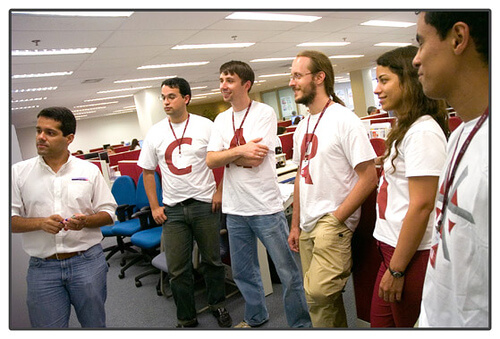As my organization has gone further down the Agile project management path (from our original process of a lean waterfall), one of the things we've started doing is daily standup meetings. These are short (15 minutes or less) meetings in which each team member reports on what they have accomplished recently and what they are planning to do today.
Standup meetings have become a fantastic tool to keep our team on track and on time, and I'm rapidly becoming convinced that they're going to be (if they aren't already) an essential part of modern software development teams.

Standup meetings are fast, directed conversations between team members where everyone updates everyone else as their own status and what they are doing. My team has come to a point where we are fully comfortable conducting our standup meetings, and so I thought I'd share some of the tips we've discovered as to how you can conduct your standups efficiently and quickly.
1. Keep it short
I cannot stress this enough: developers are busy people, and we don't like being interrupted. If a "standup" meeting is longer than 15 minutes, it is not a standup meeting. My group (six developers including me, plus a manager) aims for our meetings to be seven minutes or less. Keep the meeting short so everyone can get back to work!
2. Do it every day
Yes, every day. Even days when half the office is out on vacation and there's pressing bugs that need to be fixed right NOW. If there are people working on that day, you should do the standup meeting.
3. Use a standard template
My team's template looks like this:
- Here's what I accomplished yesterday (including task numbers, bug reports, etc.).
- Here's what I'm planning to do today (including task numbers, work requests, etc.).
- Blocks (things I cannot accomplish without someone else's help).
- Lingers (things which I am waiting to be done by someone else but are not impeding my work).
- Task status (e.g. whether or not our TFS tasks are up-to-date).
4. Don't allow the conversation to drift
Only pertinent work stuff is allowed. If any other things besides what's in your team's template need to be discussed, they should be discussed outside the standup.
5. Everybody gets a turn
This is important because, after all, we're a team, not a group of individuals. We're only as good as the least of us.
6. Meet at the same time every day
The expectation is that this time will be when everyone is expected to be working. Late morning, before lunch, works particularly well for my team.
7. Have a designated meeting leader
In our company's case, it's the team lead (e.g. me) that directs these meetings. That means it falls directly on my shoulders to ensure that the meeting is short, effective, and gets everyone involved. This is critical because whoever this person is (and it does not have to be the team lead), they are responsible for ensuring that the meeting interrupts everyone as little as possible.
8. You don't have to actually stand up
My group does our standups over Slack, because many times people just aren't in the office but are still working (i.e. on work-from-home days).
The point of having a standup meeting is to prevent those soul-sucking hour long meetings where everything gets talked about but nothing gets done. Such meetings happen when people don't know what other people are doing, and so managers or team leads call meetings to discuss who's doing what. Inevitably, these kinds of meetings get derailed because in the three weeks (or longer!) since the last meeting more has happened than can be discussed in an hour, and so the meeting takes three hours and nothing gets resolved. Those kind of meetings are a drain on resources and team morale, and should be dragged out into the street and shot. Standups are a way for everyone to explain what they've done and what they need to do, as well as getting the team to talk amongst one another, so that you don't need the soul-sucking meetings in the first place.
In short, standup meetings should be quick, directed, and done. That way, everyone can get back to what they want to be doing in the first place: programming!
The standup meeting tips I've listed above are what works for my team, at my company, but our way is not the only way to run effective standups. What tips do you have for your team's standup meetings? I'd love to hear them, so let me know in the comments!
Happy Coding Standups!
Image is Equipe durante um stand up meeting (daily meeting), used under license









